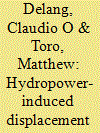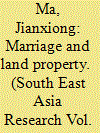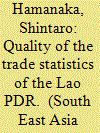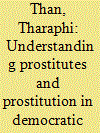|
|
|
Sort Order |
|
|
|
Items / Page
|
|
|
|
|
|
|
| Srl | Item |
| 1 |
ID:
111471


|
|
|
|
|
| Publication |
2011.
|
| Summary/Abstract |
The Lao People's Democratic Republic (PDR) is one of the poorest countries in South East Asia. Yet it has great potential for hydropower development, and the Government of Laos plans to build a large number of hydroelectric dams on the tributaries of the Mekong. Among the areas where these dams are being built is the Bolaven Plateau, the country's main coffee-producing region, inhabited by 22,000 smallholder households (15,000 of which produce coffee), distributed in small villages of 40 to 300 households each. This paper describes the attitudes of the farmers displaced due to the construction of dams. Fieldwork was carried out in communities displaced by two dams: the Huay Ho, completed in 1997, and the Xe Katam, whose construction, at the time of the fieldwork in early 2009, was planned to start in the near future. By comparing these different communities, the authors look at the attitudes, expectations and perceptions of those faced with future relocation, as well as the difficulties and coping strategies of those relocated, 13 years after they were resettled.
|
|
|
|
|
|
|
|
|
|
|
|
|
|
|
|
| 2 |
ID:
111469


|
|
|
|
|
| Publication |
2011.
|
| Summary/Abstract |
This paper discusses how a social system based on bilateral and non-hierarchical kinship is able to establish and maintain systems of authority. The Muga Lahu in Yunnan practise a bilateral and non-lineal kinship system based on the gender equality principle, and communal life is also based on equal couples' kinship networking, bound to non-lineal ties through marriage. The Lahu here never practise matrilineal, patrilineal or cognatic kinship and descent in daily life, but an individual couple is bound to immediate ancestors through the redistribution of cropland property. In communal life, family separation and farmland reorganization are carried out dynamically through the marriages of the younger generation. The flexible kinship group establishes labour-sharing, ritual-participating and intermarriage groups in everyday life. Therefore, the kinship system is closely bound to farmland redistribution and the continuation of families. This bilateral, non-lineal kinship system constitutes a dynamic social institution, but all couples are equal to each other. Due to the lack of authority over the equality of social units such as equal couples, the Lahu communal authority historically comes from superior external powers, such as the religious power linked with religious movements involved in the Yunnan-Burma frontier formation since the 1720s. The established Lahu political system was destroyed by the coming of the Qing and the Republic states, because of its anti-Han or anti-state stance in frontier history. It is clear that the superior religious power over the kinship network worked as a means of social mobilization through religious movements, and became the authority source for social cohesion in history, but it has been replaced by state-appointed cadres in current communal life in China. The Lahu case shows that more attention should be paid to the relationships between frontier history, dynamic kinship and social organization among ethnic minorities in Chinese and South East Asian frontier societies.
|
|
|
|
|
|
|
|
|
|
|
|
|
|
|
|
| 3 |
ID:
111467


|
|
|
|
|
| Publication |
2011.
|
| Summary/Abstract |
This paper analyses the meaning of poverty in different periods, as defined by the use of language. It examines the creation of codes as a representation of escape from poverty. The author shows variations in the meaning of poverty in Thai society as three overlapping layers: deprivation, used to evaluate the poor in a straightforward way; development poverty, used for negotiating with the government in the sense of receiving development benefits; and social poverty, used to set social hierarchies. All three meanings have become integrated and have been selectively used in differing contexts in everyday life. However, they each share the feature of comparing differing degrees of wealth relating directly to divisions in social class. This reflects people's awareness of the poverty gap in Thailand.
|
|
|
|
|
|
|
|
|
|
|
|
|
|
|
|
| 4 |
ID:
111472


|
|
|
|
|
| Publication |
2011.
|
| Summary/Abstract |
This paper assesses the quality of the trade statistics of the Lao People's Democratic Republic (Lao PDR) by comparing its export/import data with the import/export data of its trading partners (mirror data). The author finds, first, that publicly available Lao PDR statistics compiled by the Ministry of Industry and Commerce (MIC) are not consistent with the Harmonized System (HS) of classification. It would therefore be advisable for the Lao PDR to release the HS classification-based data. Second, there is concern about the quality of the import data. For example, total imports from major trading partners are less than half of the total of those partners' recorded exports to the Lao PDR. Lao PDR imports of fuel and gas, vehicles and parts, plus construction materials, do not seem to be correctly reflected in the statistics. The government's policy of controlling domestic prices, irrespective of international prices, seems to produce incentives for import smuggling. Third, the overall quality of the Lao PDR's export data is good compared with its import data. Most of the differences between the respective statistics of the Lao PDR and its trading partners are connected with mineral-related and wood-related products. However, export restrictions on raw logs, for example, which aim to support domestic wood processing industries, seem to produce incentives for export smuggling. The unsatisfactory quality of the trade statistics, especially with regard to imports, has important policy implications. First, there is a large loss in tariff revenue. Second, while annual Lao PDR trade deficits appear to be small or moderate if calculated using MIC statistics, the actual deficits are likely to be far larger.
|
|
|
|
|
|
|
|
|
|
|
|
|
|
|
|
| 5 |
ID:
111468


|
|
|
|
|
| Publication |
2011.
|
| Summary/Abstract |
The increase in social protests in Thailand since 2005 has been marked by a dramatic rise in the use of music for protest. This article examines the use of music by the yellow and red shirts, and contextualizes the PAD and UDD within the history of two similarly named but very different genres of Thai song: phleng chiwit [life songs] and phleng phuea chiwit [songs for life]. Phleng chiwit was part of a flowering of satirical art forms during Field Marshall Plaek Phibunsongkhram's second term as Prime Minister (1948-57) before censorship forced many songwriters to change to the new commercial genre of lukthung [Thai country song]. Phleng phuea chiwit was the preferred music of leftist students in the prodemocracy movement of the 1970s. However, the rehabilitation of phleng phuea chiwit as the official Thai protest genre has disguised the role that lukthung played during the armed struggle of the Communist Party of Thailand (CPT). The article examines the use of satirical songs and lukthung during Thailand's most recent political struggle, from 2005 to the present. It appears that red-shirt protestors (the UDD) have accessed a wide range of memories, including the most powerful counter-hegemonic traditions, whereas their yellow-shirt opponents (the PAD) have drawn on a much narrower selection of hegemonic cultural memories.
|
|
|
|
|
|
|
|
|
|
|
|
|
|
|
|
| 6 |
ID:
111470


|
|
|
|
|
| Publication |
2011.
|
| Summary/Abstract |
Prostitution in Burmese society, as in many South East Asian countries, is a taboo subject. Unlike prostitution in countries such as Thailand, however, prostitution in Burma does not attract strong media or scholarly debate. The state and the media in Burma, during both colonial and post-colonial periods, have tended and tend to see the problem of prostitution as one of 'others'. Colonialism, a decline in morality and the corruption of women influenced by modernity or Western culture have often been portrayed as the culprits. This article analyses the Burmese terms for prostitutes and examines how prostitution was portrayed by the print media between 1942 and 1962, during which time the press was thought to have enjoyed a certain degree of freedom. Seen as a threat to the British troops during the colonial period, prostitutes were subject to controversial medical screenings; yet, seen as victims of modernity during Burma's parliamentary period (1948-62), they were often left on their own to 'resurrect' their morality.
|
|
|
|
|
|
|
|
|
|
|
|
|
|
|
|
| 7 |
ID:
111466


|
|
|
|
|
| Publication |
2011.
|
| Summary/Abstract |
This study examines some of the tensions inherent in the mobilization of UNESCO World Heritage Sites for tourism in Thailand, set against the imperatives of conservation management. The authors look at two cultural sites (the Historic City of Ayutthaya and the Historic Town of Sukhothai) and one natural site (the Dong Phayayen-Khao Yai Forest Complex). They focus particularly on domestic tourism emanating from the urban middle class in Thailand, which has contributed significantly to the recent rapid growth of domestic tourism in Thailand and for which cultural and natural heritage sites have a particular attraction as tourist and excursionist destinations. The authors consider both the ways in which metropolitan-generated physical development brings pressure to bear on heritage sites and how rapidly changing lifestyles, consumption and leisure patterns and cultural values serve to redefine the use made of and attitudes towards national heritage.
|
|
|
|
|
|
|
|
|
|
|
|
|
|
|
|
|
|
|
|
|